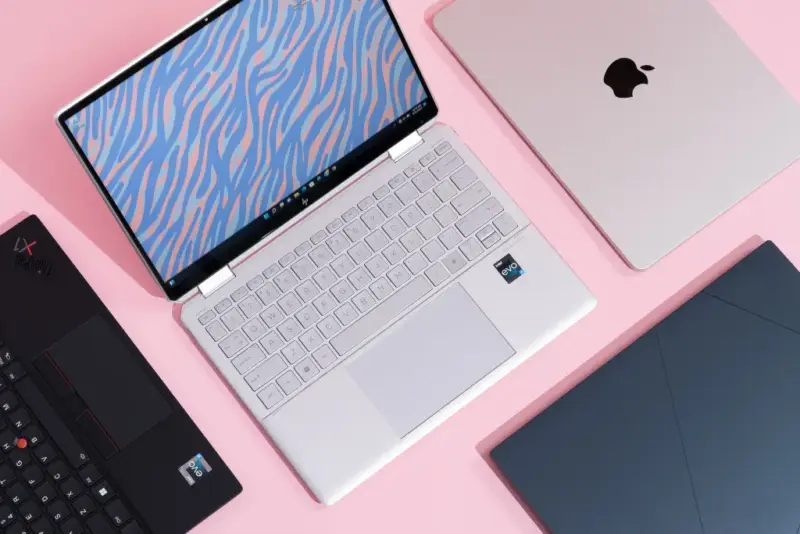What Does A Laptop Look Like? In the fast-paced digital age, laptops have become indispensable tools, seamlessly integrating into our daily lives for work, education, and entertainment. Understanding the various components that make up these portable computing devices allows users to make informed decisions when purchasing, upgrading, or troubleshooting.
Let’s take a comprehensive look at what a laptop looks like, exploring both its external design and internal components.

What Does a Laptop Look Like? – External Design
- Lid and Chassis:
The outer shell of a laptop is often referred to as the chassis, and the top part is the lid. Laptops come in various materials, including plastic, metal, or a combination of both. The lid usually features the manufacturer’s logo and may incorporate design elements or textures for aesthetics and grip.
- Display:
Opening the laptop reveals the display, which is a crucial component. Modern laptops sport LCD or LED screens, offering high resolutions and vibrant colors. The bezels around the display have slimmed down in recent years, maximizing the screen-to-body ratio for an immersive viewing experience.
- Keyboard and Touchpad:
Below the display, you’ll find the keyboard and touchpad. The keyboard layout may vary, but it typically includes alphanumeric keys, function keys, and additional keys for specific functions. The touchpad, often located beneath the keyboard, serves as a built-in pointing device for cursor control.
- Ports and Connectors:
The sides of a laptop house an array of ports and connectors, facilitating connectivity. Common ports include USB (Universal Serial Bus), HDMI (High-Definition Multimedia Interface), audio jacks, and SD card slots. Newer laptops may feature USB-C ports for faster data transfer and charging.
- Hinges:
The hinges connecting the lid to the laptop’s body allow for opening and closing. Sturdy hinges are crucial for durability, and some laptops have 360-degree hinges, enabling them to be used in different modes such as tablet or tent mode.
- Webcam:
Positioned above the display is the webcam, an integral part of laptops for video conferencing, online meetings, and capturing photos or videos. Privacy concerns have led some laptops to include physical shutters for the webcam.
- Speakers:
Laptops are equipped with built-in speakers, usually located on the sides or bottom of the chassis. While these speakers offer adequate sound quality for everyday use, external speakers or headphones may provide a better audio experience.
What Does a Laptop Look Like? – Internal Components
- Processor (CPU):
The heart of any laptop is its central processing unit (CPU). Processors from companies like Intel and AMD power the device, executing instructions and handling computational tasks.
- Memory (RAM):
Random Access Memory (RAM) is the temporary storage that enables the laptop to run multiple applications simultaneously. The more RAM a laptop has, the smoother its performance, especially when multitasking.
- Storage:
Laptops store data on internal drives, commonly using Hard Disk Drives (HDDs) or Solid-State Drives (SSDs). SSDs are faster and more reliable, leading to quicker boot times and improved overall performance.
- Graphics Processing Unit (GPU):
For tasks requiring intensive graphics processing, laptops come equipped with a Graphics Processing Unit (GPU). Dedicated GPUs enhance performance in tasks such as gaming, video editing, and graphic design.
- Battery:
Laptops are powered by rechargeable batteries that provide portability. Battery life varies among models, and advancements in battery technology continue to extend the time between charges.
- Motherboard:
The motherboard serves as the main circuit board, connecting various components. It houses the CPU, RAM slots, and connectors for other peripherals.
- Cooling System:
To prevent overheating, laptops incorporate a cooling system, often comprising fans and heat sinks. Efficient cooling is crucial for maintaining optimal performance and prolonging the laptop’s lifespan.
What Does A Laptop Look Like? In conclusion, the modern laptop is a marvel of engineering, seamlessly combining aesthetics with powerful internal components. From the sleek exterior to the intricate components within, the laptop has evolved to meet the diverse needs of users in an ever-changing technological landscape. Understanding the anatomy of a laptop empowers users to make informed choices, ensuring they select a device that aligns with their preferences and requirements.
